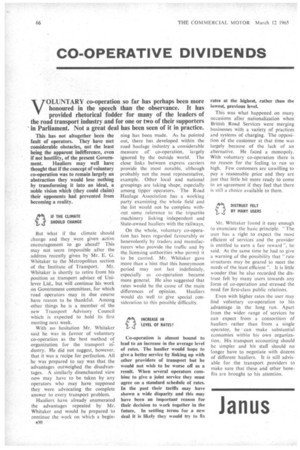CO-OPERATIVE DIVIDENDS
Page 68

If you've noticed an error in this article please click here to report it so we can fix it.
VOLUNTARY co-operation so far has perhaps been more honoured in the speech than the observance. It has provided rhetorical fodder for many of the leaders of the road transport industry and for one or two of their supporters in Parliament. Not a great deal has been seen of it in practice.
This has not altogether been the fault of operators. •They have met considerable obstacles, not the least being the apparent indifference, even if not hostility, of the present Govern ment. Hauliers may well have thought that if the concept of voluntary co-operation was to remain largely an abstraction they would lose nothing by transforming it into an ideal, a noble vision which (they could claim) their opponents had prevented from becoming a reality.
„elIF THE CLIMATE SHOULD CHANGE
But what if the climate should change and they were given active encouragement to go ahead? This may not seem impossible after the address recently given by Mr. E. G. Whitaker to the Metropolitan section
of the Institute of Transport. Mr. Whitaker is shortly to retire from his position as transport adviser of Unilever Ltd., but will continue his work on Government committees, for which road operators may in due course have reason to be thankful: Among other things he is a member of the new Transport Advisory Council which is expected to hold its first meeting next week.
With no hesitation Mr. Whitaker said he Was in favour of voluntary co-operation as the best method of organization for the transport int dustry. He did not suggest, however,• that it was a recipe for perfection. All he was prepared to say was that the advantages outweighed the disadvantages. A similarly disenchanted view now may have to be taken by any operators who may have supposed they were advocating . the complete answer to every transport problem.
Hauliers' have already enumerated the advantages repeated by Mr. Whitaker and would be prepared to continue the work on which a begin a30 ning has been made. As he pointed out, there has developed within the road haulage industry a considerable measure of co-operation, largely ignored by the outside world. The close links between express carriers provide the most notable, although probably not the most representative, example. Other local and national groupings are taking shape, especially among tipper operators. The Road Haulage Association has a working party examining the whole field and the list would not be complete without some reference to the tripartite machinery linking independent and State-owned hauliers with the railways.
On the whole, voluntary co-operation has been regarded favourably or benevolently by traders and manufacturers who provide the traffic and by the licensing authorities who permit it to be carried. Mr. Whitaker gave more than a hint that this honeymoon period may not last indefinitely, especially as . co-operation became more general. He also suggested that rates would be the cause of the main differences of opinion. Hauliers would do well to give special consideration to this possible difficulty.
INCREASE IN LEVEL Of RATES?
Co-operation is almost bound to lead to an increase in the average level of rates. The haulier would hope to give a better service by linking up with other providers of transport but he would not wish to be worse off as a result. When several operators combine to give a joint service they must agree on a standard schedule of rates. In the past their tariffs may have shown a wide disparity and this may have been an important reason for their decision to work together in the future.. In settling terms for a new deal it is likely they would try to fix rates at the highest, rather than the lowest, previous level.
This was what happened on many occasions after nationalization when British Road Services were merging businesses with a variety of practices and systems of charging. The opposition of the customer at that time was largely because of the lack of an alternative. He faced a monopoly. With voluntary co-operation there is no .reason for the feeling to run so high. Few customers are unwilling to pay a reasonable price and they are just that little bit more ready to conic to an agreement if they feel that there is still a choice available to thern.
DISTRUST FELT BY MANY USERS
Mr. Whitaker found it easy enough to enunciate the basic principle. The user has a right to expect the most efficient of services and the provider is entitled to earn a fair reward ", he said. At the same time he had to give a warning of the possibility that rate structures may be geared to meet the needs of the least efficient It is little wonder that he also recorded the distrust felt by many users towards any form of co-operation and stressed the need for first-class public relations.
Even with higher rates the user may find voluntary co-operation to his advantage in the long run. Apart from the wider range of services he can expect from a consortium of hauliers rather than from a single operator, he can make substantial economies within his own organization. His transport accounting should be simpler and his staff should no longer have to negotiate with dozens of different hauliers. It is still advisable for the transport providers to make sure that these and other benefits are brought to his attention.
























































































































